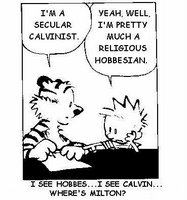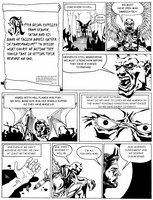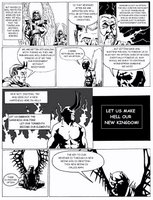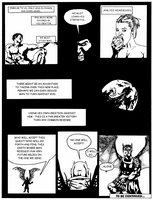The short novel "
Flatland," written in 1884 by Edwin A. Abbott, illustrates perfectly the impossibility of our human senses in perceiving God. As I have already explained
below (and which the Metaphysicals seem to accept as truth, as they have made no contrary arguments to it), perceiving does not entail
faith or
belief, but actual observation through one or more of the five senses.
First, I need to explain a few basics of the novel. The story of “Flatland” follows A. Square, a geometric shape (a square) living in a two dimensional world. Since Flatland has only height and length, and no width, the inhabitants of this world can perceive nothing more than straight lines. A. Square explicates this to his readers in Spaceland by explaining:
“Place a penny on the middle of one of your tables in Space; and leaning over it, look down upon it. It will appear a circle.
But now, drawing back to the edge of the table, gradually lower your eye (thus bringing yourself more and more into the condition of the inhabitants of Flatland), and you will find the penny becoming more and more oval to your view; and at last when you have placed your eye exactly on the edge of the table (so that you are, as it were, actually a Flatlander) the penny will then have ceased to appear oval at all, and will have become, so far as you can see, a straight line.

The same thing would happen if you were to treat in the same way a Triangle, or Square, or any other figure cut out of pasteboard…Take for example an equilateral Triangle – who represents with us a Tradesman of the respectable class. Fig. 1 represents the Tradesman as you would see him while you were bending over him from above; figs. 2 and 3 represent the Tradesman, as you would see him if your eye were close to the level, or all but on the level of the table; and if your eye were quite on the level of the table (and that is how we see him in Flatland) you would see nothing but a straight line.”
Later in the story, A. Square encounters a Sphere, who descends into Flatland from the third dimension. To A. Square, all he is able to perceive of the Sphere (regardless of the fact that the Sphere is three-dimensional) is a straight line which changes in size as the Sphere lowers himself into and out of Flatland (see diagram). For A. Square, anything outside of Flatland does not exist – it cannot exist because it is not part of his world. It is only after the Sphere has pushed A. Square out of Flatland and into Spaceland that the humble Square is able to see the Sphere for what he really is.
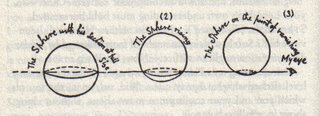
This creates a parallel between the Sphere and our so-called God. Just as A. Square is unable to even conceive the notion of a third dimension, we are unable to conceive anything that is not limited to our three dimensions. Imagine what a four or five dimensional “extra-solid” (as A. Square calls it) would look like. Try and draw a picture of it. Try and explain which direction the new dimensions would work in. It is impossible. Our limited three dimensions cannot even come close – it isn’t a matter of figuring out the correct mathematics, or developing new ways of making models; it’s just simply impossible.
Apparently there is a group of mathematicians working on developing a model of a
tesseract (the four-dimensional equivalent of a cube). This is almost as ridiculous as those people out there that think they can perceive God. Unless we can raise ourselves to some extra-dimensional status (and, I suppose, this dimension would have to be infinite – seeing as how we are dealing with the infinite God), we will never succeed in perceiving Him.
So the Pope says he can speak with God, eh? Well, unless he can comprehend an infinite voice (which he can’t), I don’t think his statement has much validity. In my books, no proof, and no
possibility of proof equals non-existent. I think you need to find a new hobby, Mr. Benedict.








